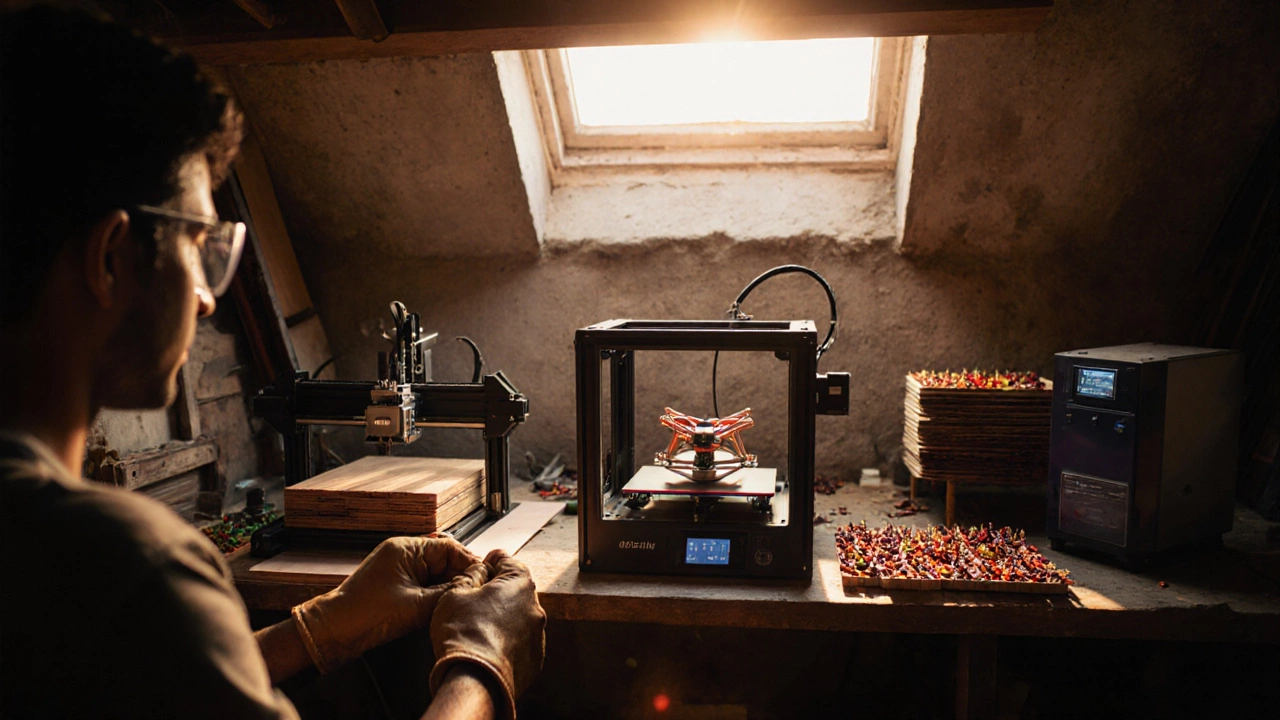Small Scale Manufacturing: How to Start, Save Money, and Grow
Thinking about turning a garage or a modest workshop into a real production hub? Small scale manufacturing lets you test ideas, serve local markets, and keep overhead low. It’s not about fancy factories – it’s about turning a simple process into a steady cash flow.
Key Steps to Launch a Small Scale Manufacturing Unit
First, pick a product that solves a real problem. Whether it’s handmade furniture, specialty textiles, or a niche pharma device, the demand should be clear. Next, map out the whole process from raw material to finished good. Write down each step, the tools you need, and the time each task takes. This simple flowchart becomes your roadmap and helps you spot bottlenecks early.
After you know the steps, calculate the basics: land or rent, machinery, labor, and regulatory fees. A recent article on starting a small‑scale business broke down the numbers – you often need less than ₹10 lakh for a modest textile line, but the exact figure varies by industry. Knowing the total lets you decide whether you need a loan, investors, or can self‑fund.
Don’t forget permits. In India, a manufacturing unit may need an industrial licence, GST registration, and sometimes sector‑specific clearances (like FDA for pharma). Getting these sorted at the start saves headaches later.
Saving Money and Cutting Waste
Money matters most when you’re keeping the operation tiny. One proven approach is the “7 wastes” framework from lean manufacturing. Look for overproduction, waiting time, excess inventory, unnecessary transport, defects, over‑processing, and idle workers. Cutting just a few of these can shave 10‑15% off your costs.
The Mom method, a simple step‑by‑step system, helps you standardize each task. Write down the exact sequence, the tools, and the quality checks. When everyone follows the same recipe, errors drop and you spend less on rework.
Another cost‑saving tip is to source locally. For a small furniture shop, buying wood from nearby suppliers reduces transport and supports quick replenishment. The same logic works for bolts, fabrics, or chemicals. Build relationships with a handful of reliable vendors and negotiate bulk discounts once you hit steady volume.
Finally, track every rupee. Use a basic spreadsheet or free accounting software to log material costs, labor hours, and sales. When you see a spike in a particular expense, you can act fast – maybe a machine needs maintenance or a supplier raised prices.
Small scale manufacturing isn’t a shortcut; it’s a disciplined way to grow a business without the risk of a massive plant. By choosing the right product, mapping the process, covering legal basics, and constantly hunting waste, you set the stage for sustainable profits. Ready to turn that idea into a humming workshop? Grab a notebook, sketch your flow, and start budgeting – the first real step is always the hardest, but it’s also the most rewarding.

What Is the Difference Between a Manufacturer and a Factory?
Learn the real difference between a manufacturer and a factory-especially if you're starting a small-scale manufacturing business. Know who owns the brand, who does the making, and how to avoid getting ripped off.

Top In-Demand Small Scale Manufacturing Products for 2025
Discover the hottest small‑scale manufacturing products for 2025, why they’re in demand, and how to launch them profitably.

Understanding Small Scale Manufacturing: Definition, Benefits & How to Start
Explore what small scale manufacturing means, its benefits, key traits, examples, and step‑by‑step guide to launch your own tiny production business.

Fastest Growing Business: What's Hot in Manufacturing Right Now?
Manufacturing is exploding with new ideas and fast-rising businesses, especially if you know where to look. This article looks into which manufacturing businesses are actually seeing crazy growth in 2025, and what's driving it. You'll find real examples, what makes these businesses tick, and practical tips if you're thinking of starting your own. Cut through the hype and see what works in the real world. It's all about helping you spot real opportunities and avoid outdated trends.

How to Patent an Idea and Get It Made
Thinking of turning your genius idea into reality but not sure where to start with patenting and manufacturing? This guide breaks down the steps to patent your concept and see it through to production. We explore the process of protecting your intellectual property, navigating patent applications, and moving towards small-scale manufacturing. Learn the insider tips and tricks to avoid common pitfalls and make your idea come to life.

Understanding What Small Scale Manufacturing Is All About
Small scale manufacturing, often referred to as micro or craft production, involves producing goods on a smaller scale as opposed to large factories. This form of manufacturing is essential for supporting local economies and provides opportunities for entrepreneurs with lower capital. Dive into the world of small scale manufacturing, explore its significance, and gain tips on starting your own production line with fewer resources.

Exploring Small Scale Manufacturing: Top Industries for Small Businesses
Small scale manufacturing stands as a vibrant arena for aspiring entrepreneurs. Numerous industries within this sector thrive on the innovation and flexibility small businesses bring. From the charming world of handmade crafts to the bustling operations of food production, there are niches ready to support new ventures. Understanding which industries offer the best opportunities is key for success. Let's delve into what makes these industries so beneficial for small businesses.






